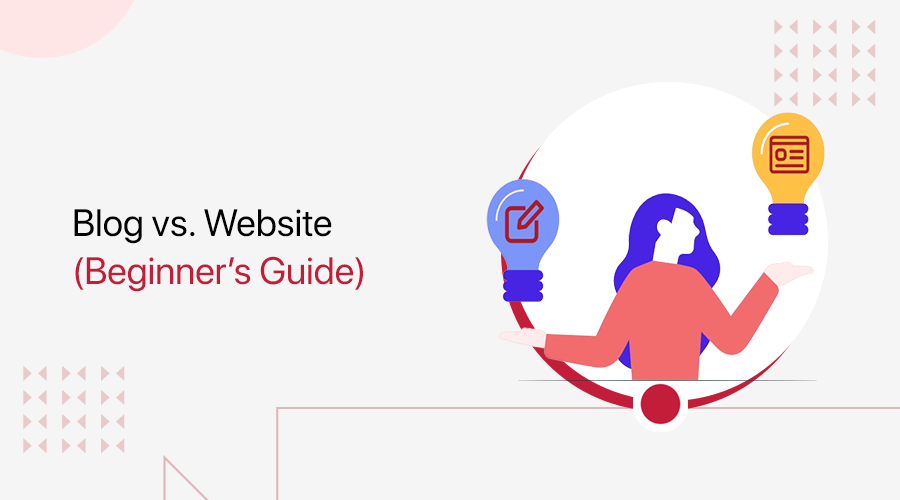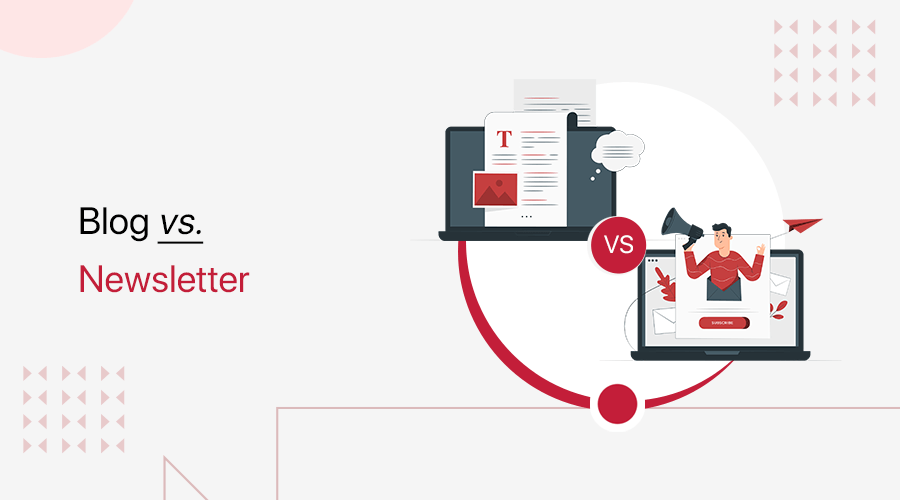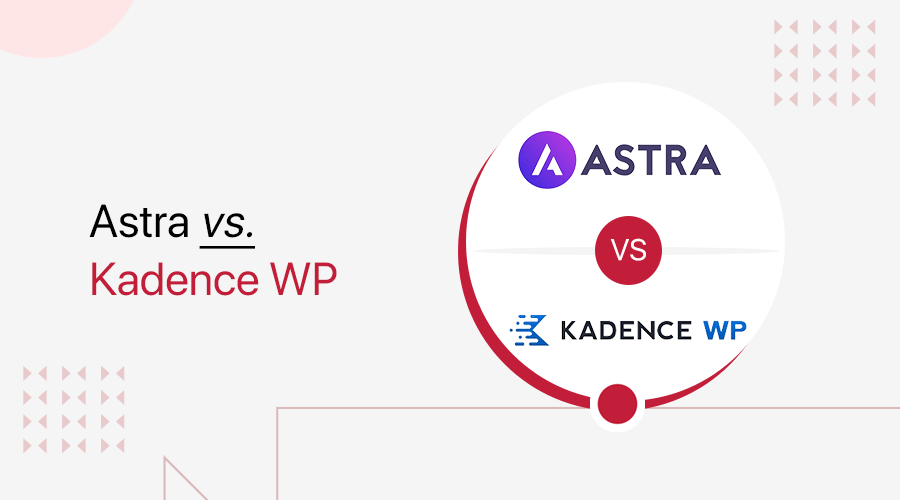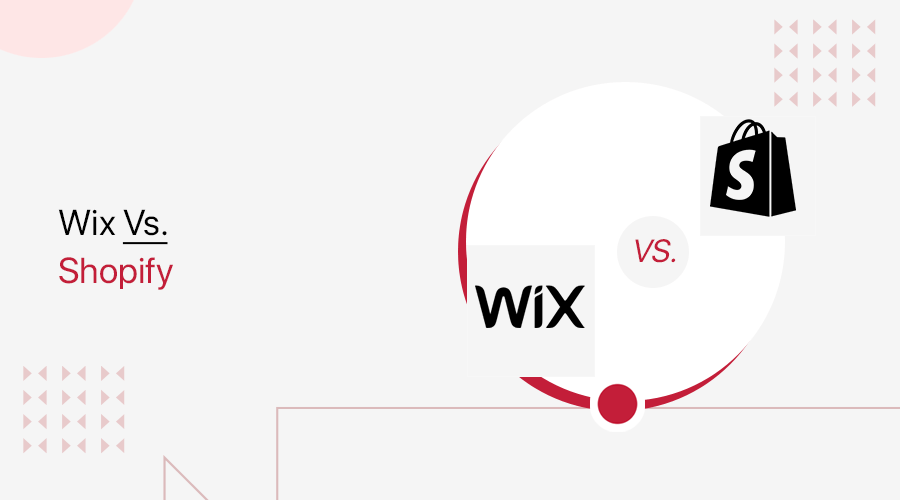
Are you wondering which is a better eCommerce platform between Wix vs Shopify? If yes then, you’ve come to the right spot to know that.
One of the crucial aspects of creating a stunning online store is picking the appropriate website builder. There are tons of site builders available in the market. So, when it comes to eCommerce, Wix and Shopify both are well-known site-building platforms.
Both of these platforms are elite in their respective fields. However, if you’re new to eCommerce, then choosing the right eCommerce platform might be a little overwhelming.
So, in this article, we’ve put up a detailed comparison of these 2 website platforms i.e. Wix vs Shopify, from different angles. Let’s jump right in!
A) Wix vs Shopify – Overview
Wix and Shopify are both popular website-building platforms for creating your own digital presence for your business.
In general, you can create any kind of eCommerce store using these eCommerce builders. So, whether you choose Wix or Shopify, both have a powerful UI and a plethora of features to help you build a stunning eCommerce site. However, their workings differ.
Before moving ahead, let’s have a quick overview of each of them.
1. Overview of Wix
Wix is a user-friendly website builder that allows you to create various types of websites without having to write any code. It gives you a versatile drag-and-drop way for creating your professional website. In fact, it covers 2.9% of the CMS market as per W3Techs statistics.
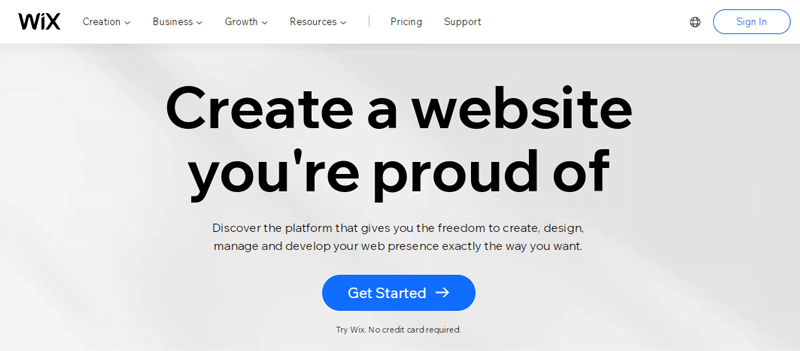
To let you know, Wix is a fully hosted platform with its own web hosting service. That means you don’t have to buy separate hosting for your site. Furthermore, its free package includes a subdomain that looks like sitename.wixsite.com.
Wix comes with varieties of themes that you can use to exhibit your products and services. You can further tweak it to meet the specific needs of your eCommerce website. Moreover, themes are built responsively so that your site looks great on any device.
However, you’ll need to upgrade to one of its premium packages to link your domain and have access to eCommerce features. It provides one of the easiest and most straightforward eCommerce website development experiences.
So, if you’re a small business looking to go online in a budget-friendly way, then Wix can be the way.
2. Overview of Shopify
Another well-known eCommerce platform on the market is Shopify. You can quickly create your eCommerce website on this platform. It comes with everything that you’ll need to start selling online right away. Not to mention, as per W3Techs statistics it covers 6.7% of the total CMS market.

As Shopify is a fully hosted independent platform, it takes care of your online store’s overall technological aspects. Essentially, it includes hosting, a domain, marketing tools, and other facilities for setting up an online store. As a result, you can divert all your focus on the growth and management of your business.
The best part, you can get started right away by signing up for a website on Shopify.
It includes ready-made online store templates to get your first online store running in no time. You can use various customization tools to alter the theme further to make it more visually appealing. Moreover, it comes with many apps that you can integrate to create a fully functional online store.
Shopify’s primary aim is to allow anybody to create their online stores without using code or design. It’s a plus point if you know HTML and CSS, but coding knowledge isn’t required. Consequently, this makes Shopify one of the most popular and well-known eCommerce platforms on the market today.
B) Wix vs Shopify – eCommerce Features
In a general sense, eCommerce refers to electronic commerce or internet commerce. It refers to the act of buying and selling goods and services over the internet. Or let’s say conducting business using computers and the internet.
In recent years, an increasing number of people have recognized the value of online marketing and business. As a result, many have begun to set up an online store or set an eCommerce website to push their business forward.
There are many eCommerce website-building platforms that help you do so. Coming to this moment, you might have already known that Wix and Shopify are well-known eCommerce platforms for creating an eCommerce website.
So, let’s look forward to a head-to-head comparison of the eCommerce features that these platforms provide:
1. eCommerce Site Builder
Wix and Shopify provide a decent platform to create your eCommerce website or online store.
Not to mention, creating an online store is unquestionably a difficult task. That’s why the eCommerce builder you use must be user-friendly. The platform should be simple to use as well as friendly for non-techies.
So, let’s compare which is the better eCommerce site builder: Wix or Shopify?
Wix eCommerce Site Builder
The first thing to note about Wix is that it’s a fully-hosted platform. As a result, whether it’s putting up a hosting service or anything else, you won’t have to worry about anything. The Wix eCommerce platform includes various easy-to-use eCommerce tools that help you to sell online and in-store.

Like most site builders, you can easily sign up at Wix using your email address. All you need to do is click on Create Your Store on Wix’s official website and sign up with your email address. Then, add the built-in tools, choose an online store theme, and start working on your online store website.

Further, you can even let Wix ADI(Artificial Design Intelligence) create a website for you by answering simple queries. Or you can choose a template and make it your own with easy drag and drop features. However, you need to upgrade to Wix’s premium version to officially sell the products.
Wix helps you to grow your eCommerce business through email marketing, social posts, Facebook ads, as well as client management.
Lastly, we can say that you can easily kickstart your eCommerce website with Wix. It takes care of the majority of tasks, so you can focus entirely on building your company.
Shopify eCommerce Site Builder
On the other hand, Shopify is a fantastic eCommerce site-building platform built dedicatedly for eCommerce websites. It includes several tools to assist you in setting up and running your online store in no time. Similar to Wix, it’s also a fully-hosted platform that takes care of hosting, domain, and more.
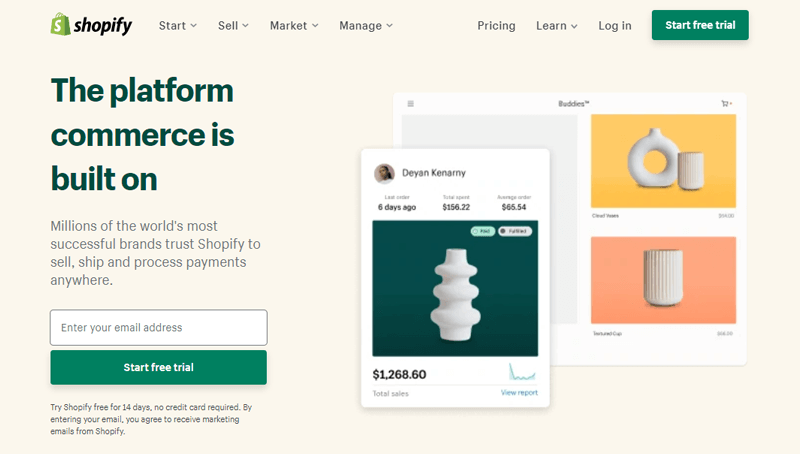
To get started with Shopify, first, you need to create an account on its official website. You can click on the Start Free Trial option to use Shopify for 14 days without requiring any credit card.
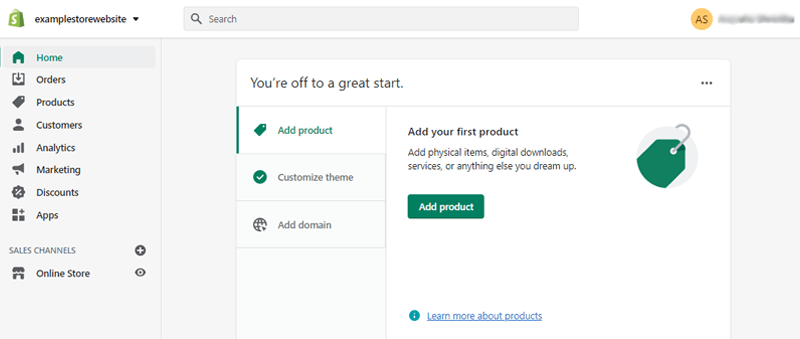
You need to fill out your store name, business and personal information, and other details while creating an account. Once you complete all of these, it’ll direct you to your Shopify Dashboard.
You’ll see various functionality such as orders, products, analytics, etc., on the left sidebar of the dashboard. You can now begin developing your eCommerce site. And navigate to the various customization choices available to tailor your site to your choice.
Moreover, Shopify’s features are organized into plans so that you can easily pick the one that best meets your needs.
Winner – Shopify
If you’re newly trying to launch a small eCommerce website, then Wix is the way to go. However, its customization capabilities can be overwhelming, and this provides quite a learning curve than that of Shopify.
On the other hand, Shopify is an eCommerce dedicated website building platform. It has sophisticated features presented in a straightforward manner making it suitable for launching larger eCommerce websites.
But don’t make a decision right away! When it comes to choosing the right eCommerce website builder, there’s much more you need to think about.
2. Payment Options
When it comes to choosing the right eCommerce platform, it’s necessary to explore different payment options for your store. It’s crucial to understand the payment procedure so that your consumers can pay for your products and services.
Essentially, your customers should have the option to pay for their orders whenever they check out with the items they want to buy. With that, let’s take a look at the various payment alternatives that Wix and Shopify offer.
Payment Options in Wix
Talking about payment options, Wix provides multiple payment methods so that payment procedure becomes easy for you and your customers. This way, you won’t have much pressure to use a specific method.

You can connect your store to any payment method you like. That means you can collect payments via debit/credit cards through online gateways as well as offline payments.
The best part, Wix doesn’t charge you any transaction fees. Nevertheless, you’ll have to pay the standard fees as per various payment gateways standards.
Essentially, you can choose from over 50 leading payment providers for your eCommerce website. It works nicely with Wix Payments, PayPal, Stripe, Square, and several other popular payment gateways.
Also, you can see the comprehensive list of your payments in the Wix dashboard.
Payment Options in Shopify
Shopify provides several payment gateway options for accepting payments from your customers.

You can use their own Shopify Payments as the payment option. It’s their easy-to-use payment system for accepting payments online. Shopify Payments accepts all major credit cards and eliminates the need to set up a third-party payment gateway.
However, your website should fall under one of the supported countries to use this service. Furthermore, your business shouldn’t fall under prohibited business.
Besides, you can integrate with a third-party service to accept credit card payments from your consumers. It works with over 100 other payment providers all across the world.
You can also use PayPal, Facebook Pay, Amazon Pay, Apple Pay, and more. It also accepts other digital payment methods, such as cryptocurrencies. But, you have to pay up to 2% on every transaction you make through the external gateways.
Winner – Wix
Shopify offers a wide range of payment alternatives to make things easier for your customers. However, it charges 2% on every transaction you make through external gateways, and meanwhile, Wix lets you do that for free.
So, this round goes to Wix.
3. eCommerce Themes & Design
It’s equally important to have a visually appealing front end of your eCommerce store or website along with a powerful backend. There is a high chance of converting your site visitors into your customers only when your website looks attractive.
Hence, you should always look for themes and designs that best suit your business. Having said that, now let’s compare the eCommerce theme design possibilities offered by Wix and Shopify.
eCommerce Themes & Design of Wix
Wix has over 800 free appealing layouts to choose from that cover a variety of aspects such as online stores, business and services, blogs, and so on. You can further customize these eye-catching template layouts as per the necessity of your eCommerce site.
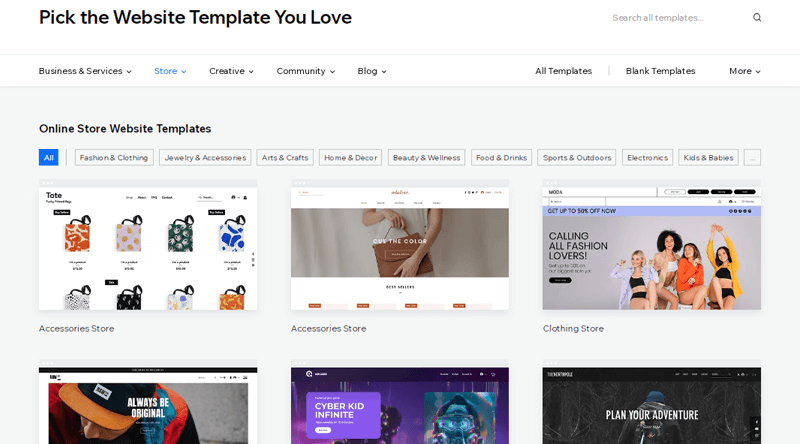
It might be a little difficult to choose from the vast templates. For that, Wix offers 19 exceptional Wix templates built particularly for eStores. This way, you can easily choose the one that best meets the requirements of your online store.
In contrast, Wix’s templates are not changeable once your eCommerce website goes live. The theme you chose at the beginning will be the same until the end. So, this might create inconvenience if you want to restructure your website or online store.
eCommerce Themes & Design of Shopify
Shopify provides around 80 different themes for your eCommerce websites. Basically, 10 of them are free among these themes, and 70 are premium ones. Its themes are generally contemporary and adaptable. In fact, they are designed in such a way that it helps you to communicate your brand easily.
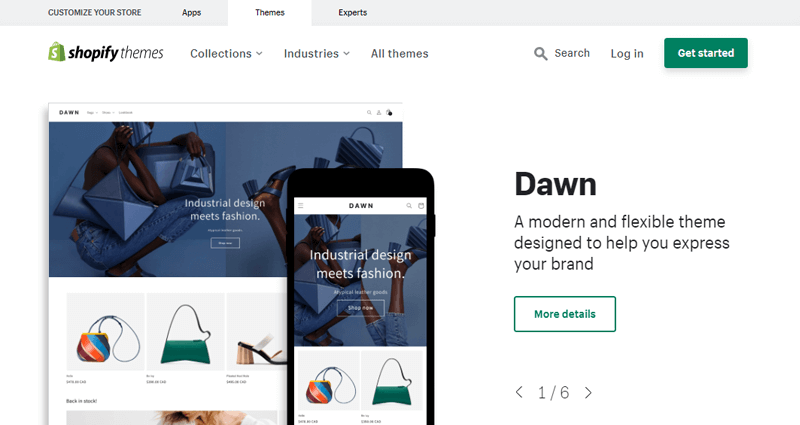
You can purchase the themes from Shopify themes. Afterward, all you’ve to do is pick one of these themes and customize the look of your site. The typical cost of a Shopify premium theme is $100 to $250. It’s definitely costly in comparison to Wix as Wix provides you with themes free of cost.
In addition, Shopify’s new Online Store 2.0 theme format was recently released. The new Shopify templates are assured to be speedier and more adaptable than earlier versions.
Winner – Wix
Well, this round goes to Wix because it offers comparatively more themes than that of Shopify. You can get all the Wix themes for free of cost meanwhile, Shopify provides only 10 free themes. Also, the premium themes of Shopify are a little more expensive.
However, you should be conscious while choosing the theme for your eCommerce site, as you cannot change it once your site goes live.
4. Commission Policy
The commission is the certain amount of transaction fees that the site-building platform takes for every sale made. It’s necessary to understand the commission rate or transaction policy of the platform you choose for your eCommerce site.
So, let’s compare the commission policy of both Wix and Shopify.
Commission Policy in Wix
One of the best things about Wix is that it doesn’t charge any transaction fees for the sales that you made on your site. That means you’ll save a bigger proportion of your income to the net worth earned from your site.
However, you do have to pay the standard rate charged by different payment gateways. But besides that, all the money that you’ve made from the sales is all yours.
Commission Policy in Shopify
Shopify charges 2% of every sales transaction made from your eCommerce site or online store. So the only way to escape the transaction fee is to use Shopify Payments. As mentioned before, it’s Shopify’s payment gateway option.
However, Shopify Payment is supported only in a few limited countries. Besides, if you’re operating from any other country, you’ll have to choose another payment gateway option. Also, you’ve to pay the transaction fee along with the standard rate charged by different payment gateways.
Winner – Wix
Well, talking about the commission policy of these two platforms, then Wix wins this round. You don’t have to pay any extra transaction fees for the sales made on your eCommerce site. Meanwhile, you’ve to pay a 2% transaction fee for every sale made to Shopify.
5. Security
Numerous people buy and sell products in various locations of the world. As a result, there is a high chance of fraud, hacking, and other types of criminal activities. It’s due to the trade-off in money where sensitive information such as credit card numbers is exposed.
Strong security is one of the topmost priorities for the eCommerce business. As a result, it’s crucial to choose such an eCommerce site platform that takes well care of the consumers’ data and information. When it comes to security, both Wix and Shopify provide decent security.
Let’s look at various security settings available in Wix vs Shopify.
Security in Wix
Wix is a fully hosted platform, thus it handles all of your site’s hosting and server maintenance. This means that the Wix team is in charge of a significant portion of your site’s security. So, they take care of your site’s upgrades, backup, and security.
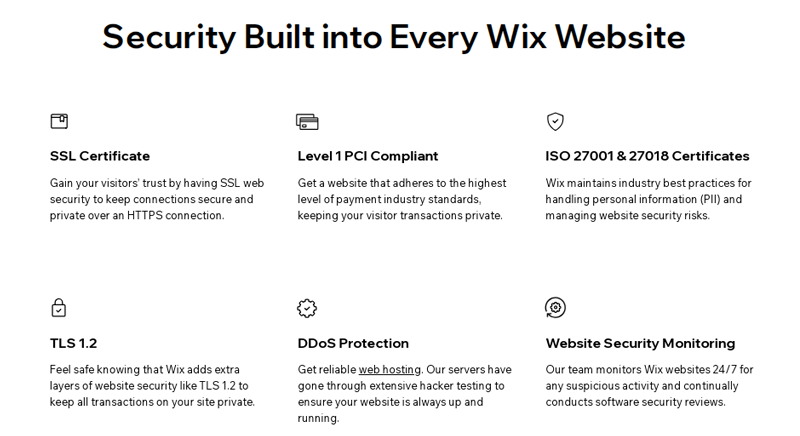
In fact, every Wix plan includes an SSL certificate. It uses HTTPS to secure data from attackers or hackers on your site and in-browser interactions. Also, it comes with SSL/TLS security to protect the clients’ online transaction details. Thereby, it provides significant security for creating an online store or any eCommerce site.
Besides, it’s GDPR and CCPA compliant website building platform. In addition, it has DDoS protection and centralized website security. It also provides 2 step verification to prevent any kind of unauthorized entry to your account.
Security in Shopify
Shopify, being a dedicated eCommerce site-building platform, creates a lot of transactions quickly. Thus, Shopify continues to provide complete protection for your eCommerce site. As a result, neither vendors nor customers need to worry about being robbed when using this platform.
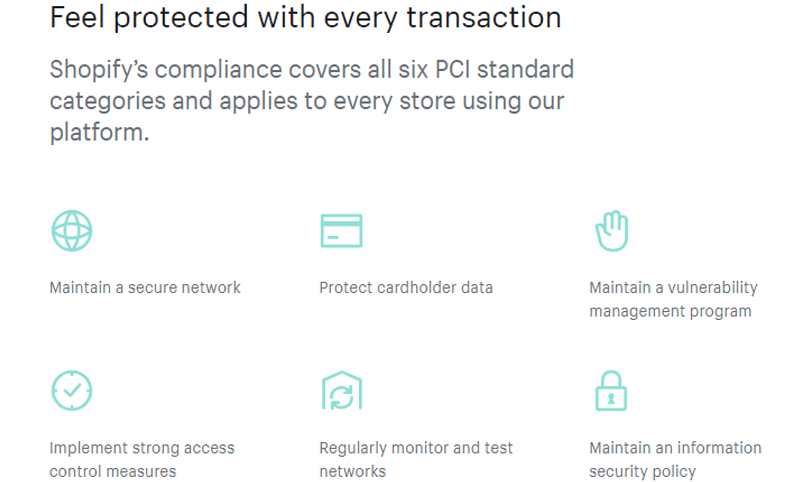
It’s a licensed SSL (Secure Socket Layer) eCommerce platform for secure data transmission and protection of personal information. It ensures your online security by safeguarding your store’s content by using HTTPS instead of HTTP.
Also, it verifies that your website complies with the PCI-DSS (Payment Card Industry Data Security Standard). This way, your site can handle credit card payments legally and in accordance with accepted industry standards.
You also get two-factor authentication to prevent unwanted users from gaining access to your account. Shopify ensures that you get the best security for your online store to provide consistency to your reputation.
Winner – Tie
It’s tough to decide the winner of this round as both Wix and Shopify handle security rigorously. Both of them ensure that you get a safe and secured platform to run your eCommerce website. You get two-factor authentication, SSL certificate, HTTPS, and more in both Wix and Shopify.
So, we can consider this round of Wix vs Shopify as a tie.
6. Shopping Cart Features
A shopping cart means a functional feature that allows customers to shop on your online website. With the proper shopping cart feature on your website, you can keep a clear and structured record of all your transactions.
This helps to avoid any kind of misunderstandings and confusion to both you and your customers. In addition, it aids in efficient client management during peak hours. In fact, without shopping cart features, it’s pretty impossible to achieve eCommerce’s overall goal that promotes convenience.
Let’s look at shopping cart features offered by Wix and Shopify.
Shopping Cart Features in Wix
Wix offers several shopping cart features to convert visitors to your customers.
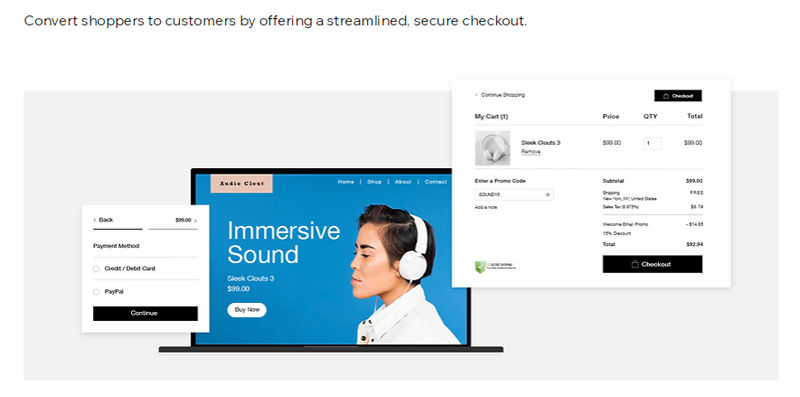
It includes a currency converter feature so that your customers can browse your shop in their local currencies. All you need to do is select the currencies you wish to show on your website.
Also, it has integrated member areas allowing you to build a dedicated consumer base. This is where your member customers can make a wishlist, examine their order history, use express checkout, and more after they log in.
Moreover, you can also add independent Pay buttons to your products on the site. Consequently, this helps you to directly accept payments for specific products from your customers.
Besides, you can retrieve abandoned shopping carts by sending automated emails. This helps in converting your leads to customers by encouraging them to complete their purchases. You can even recommend related products that might increase sales.
Shopping Cart Features in Shopify
Shopify offers a dependable and secure shopping cart solution for your eCommerce website. The shopping cart software integrates with over 100 payment gateways, allowing you to accept credit cards and PayPal purchases.
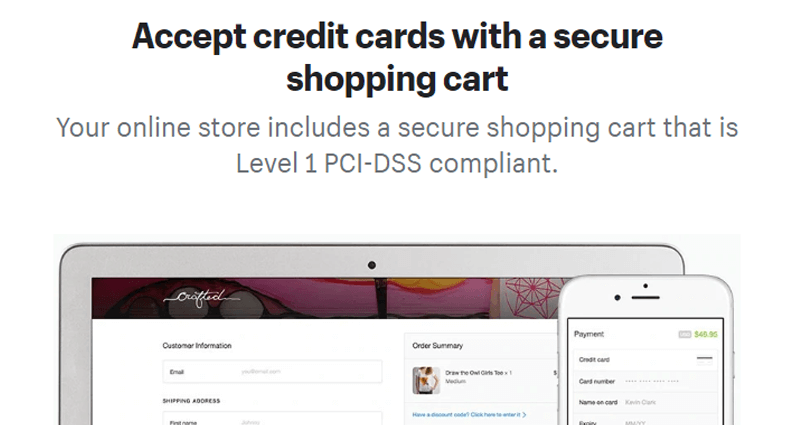
The shopping cart software in your store is set to use your local currency. It determines tax rates based on the location of your business and buyers. You can also convert the shopping cart checkout page into one of 50+ languages.
It’s PCI Level 1 certified and employs 256-bit SSL certificates to protect order information. This protects and safeguards your customers’ information related to credit cards and orders.
Additionally, it also has a mobile dedicated shopping cart feature. Shopify recognizes any customer that visits your site using mobile devices. It then displays an optimized mobile shopping cart checkout.
Shopify gives an email list of those who went to the checkout page but did not finish the transaction. Sending an email to customers who have abandoned their shopping cart can help you recover sales that would otherwise be lost.
Winner – Shopify
In terms of shopping cart features offered by Wix and Shopify, both of the platforms are quite competitive. Wix does offer a currency converter, dedicated pay buttons, recovering abandoned shopping cart features, and so on.
But so does Shopify, and it even has a mobile dedicated shopping cart feature, multilingual checkout page, and more features than Wix. So, this round of Wix vs Shopify is won by Shopify.
7. Inventory Management
Managing inventory is one of the crucial aspects of an eCommerce website. Inventory management is a systematic way of acquiring, storing, tracking, and delivering merchandise for an eCommerce business.
A decent inventory management technique can help your eCommerce site to boost productivity and cut expenses. You can quickly identify the patterns and track the status of the business in real-time. Also, when you update stocks levels on the website, it helps you to inform your customer.
So, let’s look at how Wix and Shopify manage the inventory for your eCommerce site.
Inventory Management in Wix

Wix provides 2 methods to manage the inventory for your eCommerce store It includes open APIs that let you link your chosen inventory methods to your Wix store. Afterward, everything is smoothly synchronized consistently.
Currently, Wix Stores provides two inventory management options.
One is keeping track of your inventory on the site. You’ve to set the number of particular products you have on hand. The inventory amount is then immediately updated when you make a sale.
Another method is to set an “In Stock” or “Out of Stock” status to products manually. You can personally change the status of a product to “Out of Stock” when you run out of it.
This way, you can keep the track of your stock products both automatically and manually.
Besides, you are given the choice of whether to update your inventory after customers place their order or once they make payment. You can also enable back-in-stock notification. This way, when an item is out of stock, users can request an email notification when it becomes available.
Inventory Management in Shopify
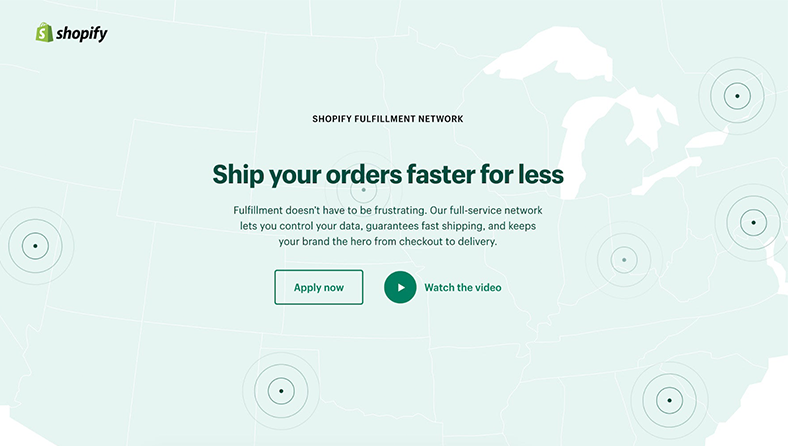
Similarly, Shopify provides an inventory section where you can set up inventory tracking of your site. You can track changes in inventory levels and alter your inventory levels.
When you utilize Shopify, you’ll be able to take advantage of various features like stock alerts, automated buy orders, year-end inventory reports, and so on. Moreover, its inventory monitoring system gives you complete control and insight into your business.
You can also see how inventory is transferred from supplier to customer and everything in between. This way, you can easily look at the history of inventory adjustments for various products that Shopify tracks.
Besides, Shopify offers many inventory apps and setup assistance for retailers to make the process go more smoothly.
Winner – Shopify
Both Wix eStore and Shopify provide a decent inventory management system to track your stock records. Without a doubt, you can easily manage your inventories hassle-free from any of these platforms.
However, the inventory management system is limited to only small online stores in Wix. Meanwhile, in Shopify, you get visitor analytics, revenue reports, and inventory management. This makes Shopify more suitable for larger eCommerce stores and websites.
So, this round of Wix vs Shopify goes to Shopify.
8. Tax Settings
As you might already know, tax is one of the crucial aspects of any business, whether you run it physically or online. You pay a certain amount of money out of your income to the government. Thus, it’s necessary to have a proper tax setting on your eCommerce website.
So, let’s look at the tax settings feature offered by Wix and Shopify.
Tax Settings in Wix
With Wix, you can easily get an automated sales tax calculation in a few simple clicks. You can provide your customers with a simple checkout procedure that includes an up-to-date tax rate. You can also provide geo-specific tax rates with Avalara for every transaction anywhere in the world.
Wix provides two methods for setting taxes on your products. One is to add tax at checkout. For example, if you’re selling example goods at $10, then it shows $13 at the checkout, including sales tax.
Another is to pre-include the tax in the product’s price. If the example goods cost $15 then, $13 is the price of the product, and $2 is the sales tax.
You can use any method of tax setting at your convenience.
Tax Settings in Shopify
Similar to Wix, Shopify also handles the most routine sales tax automatically. This helps you to save a lot of time for tax calculations. You can also build up tax overrides to deal with special tax rules and circumstances.
Shopify uses a variety of default sales tax rates that are updated on a regular basis to calculate taxes. If you utilize the default rates, be sure they’re up to date and accurate for your needs. When required, you can override them.
When many transactions are happening, it’s very obvious that it might get a little hectic to sort out the taxes. So, Shopify does provide tax reports that you can find in its Analytics sections of your dashboard.
Besides, it has many documentation guides on setting up taxes, location-based tax settings, tax overrides, exemptions, etc. This will help you quickly sort out the tax things on your eCommerce site.
Winner – Tie
As tax is one of the fundamental phenomena of any business, both Wix and Shopify provide necessary tax settings. You can easily impose the sales tax on your products and inform your customers. Both have a tax calculator that makes it quite easy to calculate tax. So, we can consider this round of Wix vs Shopify as a tie.
9. Shipping Management
You can understand shipping as successfully delivering the paid products to your customers in their location. It’s one of the end goals as well as a crucial aspect of your eCommerce website. Consequently, you should make sure that your site-building platform has simple, cost-effective, and quick shipping management.
Now, let’s compare the shipping management provided by Wix and Shopify.
Shipping Management in Wix
Wix can manage your shipments and print labels for all of your orders from a single dashboard.
Moreover, it has integration with international shipping providers such as Shippo, ShipStation, Fetchy, and more. With this, you can better organize your deliveries with better rates and speedier shipping.
In addition, you can easily calculate shipping costs individually. Wix facilitates setting your shipping rates for items with precise shipping charges. All you need to do is create a flat cost shipping rule or determine your prices by location, category, weight, and so on.
Besides, you can also provide free shipping to the local customers of your regions to increase purchases. You can create a free shipping rule for orders over a certain amount or give your customers a special voucher.
Shipping Management in Shopify
Essentially, Shopify provides 3 methods for the delivery of your products. Namely shipping, local delivery, and local pickup. You can use any of these methods at your convenience.
Shopify is there for you in every step of the shipping process and its management on your eCommerce website. Offering free delivery to syncing up with alternate shipping suppliers makes the complicated shipping procedure simple.
You can further set flat or calculated shipping rates to your general shipping profile that applies to all of your products. Or, you also can add items to custom shipping profiles that have their shipping costs.
In addition, if you’ve got an eCommerce website that runs in various locations, you can configure shipping rates as per the location. This way, you’ll have greater control over your delivery costs.
It also assists you in providing more flexible and contact-free shipping options such as curbside pickup and local delivery. As a result, you’ll never be left stranded when it comes to shipping with Shopify.
Winner – Shopify
Wix does provide good shipping management, but that makes it suitable only for small stores. However, Shopify outperforms with its robust shipping capabilities. It offers the tools to deliver goods to clients in various ways, including curbside pickup, local delivery, and international shipping. So, Shopify wins this round.
10. Customization Options
A website builder must have enough customization options to meet the needs of your website. Only with enough customization capabilities, you can make any changes you want on your site. Such as changing the appearance, adding or removing elements, changing design and functionality, etc.
Thus, choosing a platform with decent customization options to get total flexibility is critical. So, let’s compare the customization options offered in Wix vs Shopify.
Customization Options in Wix
Wix gives you complete control over the look and feel of your online business, which should come as no surprise. After all, it’s first and foremost a website builder.
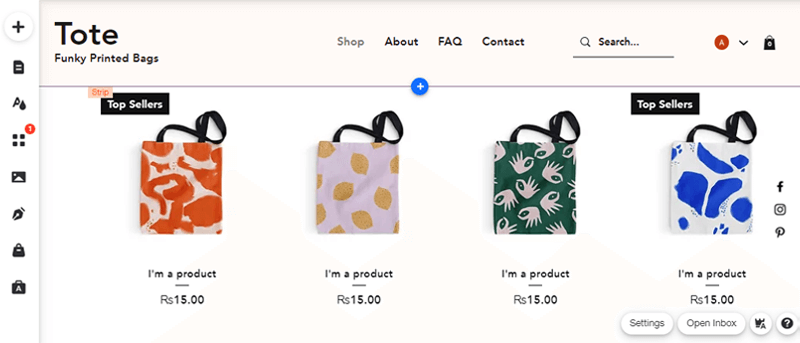
As you might already know, Wix offers a plethora of eCommerce website designs for a variety of businesses. You can further tailor these templates to your choice with Wix’s drag and drop editor. You can customize the design of your menu, colors, fonts, text, and many more.
Wix editor can, however, be a little overwhelming in the first place, but once you get used to it, you can create an amazing site. Also, you can perfectly reflect your brand on your eCommerce website.
Customization Options in Shopify
Shopify is a dedicated eCommerce platform to build your eCommerce website. It’s better able to handle larger stores and allows you to add a huge number of products much more quickly.
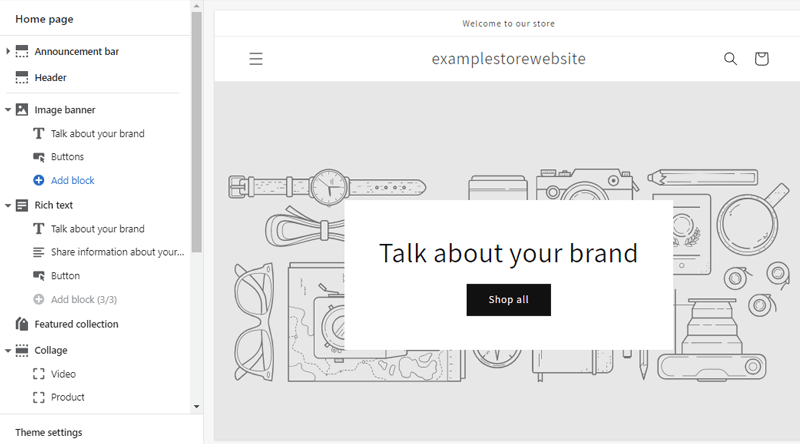
It does offer customization options to change the look and feel of your eCommerce website. However, you don’t get the drag and drop editor as of Wix. Instead, you must first edit the content in the back end of your site and then preview it to see the changes made on your site.
Winner – Wix
Wix has comparatively more customization capabilities than Shopify. As Wix primarily is a website building platform, Shopify is a dedicated eCommerce solution. So this round of Wix vs Shopify goes to Wix.
11. Other Key eCommerce Features
Besides the above-mentioned features, let’s look at some of the other key eCommerce features these platforms provide.
Other Key eCommerce Features of Wix
Wix provides the following key eCommerce features that are:
- Mobile optimized storefront with built-in mobile editor
- Extensive media library with stunning, attention-getting graphics.
- Provides multiple sales channels such as Google Shopping, eBay, etc that can be managed from a single dashboard.
- Easily translate your store into more than 90 languages.
- Robust blog platform to include product descriptions and contents.
- Add numerous colors, materials, sizes, and more. You can also adjust the weight, pricing, and stock of your products as needed.
- Provides customer profiles to get an insight into their order history, shopping habits, and contact details.
Other Key eCommerce Features of Shopify
Shopify provides the following key eCommerce features that are:
- Quickly sell your products on various internet platforms, including Facebook, Amazon, Messenger, and Instagram.
- Shopify analytics and reports are available to assist you in learning more about your sales and customers.
- Provides complete control over your store’s HTML and CSS, making it simple to personalize every part of it.
- You can either use your domain name or buy one from Shopify.
- It includes a built-in mobile commerce shopping cart with your Shopify store.
- Translate your theme in more than 50 languages to provide a diversified eCommerce site.
Winner- Shopify
Considering all these eCommerce features of both Wix and Shopify, it’s tough to consider who exactly wins.
Wix is primarily a website building platform to create various types of websites, including eCommerce sites. It’s worth noting Wix eCommerce features perfectly suit small online stores and eCommerce sites.
However, Shopify is an eCommerce-dedicated solution built specifically for larger eCommerce sites. As a result, it has wider capabilities and functions than Wix. So, while comparing all the eCommerce features provided by both platforms, Shopify wins this round of Wix vs Shopify.
But don’t just decide yet! There are still other features that both of these platforms have to offer.
C) Wix vs Shopify – App Store
Apps are the additional application software or program that adds more functionality to your existing eCommerce store or website. You can integrate various apps to increase the performance of your online store by giving you new resources and features.
Both Wix and Shopify have feature app stores with a variety of free and paid apps to assist eCommerce across the globe. So, let’s compare the app stores of these platforms individually.
App Store in Wix.
Wix takes the approach of providing all of the tools needed to create, design, and maintain an online business in its toolkit. As a result, there aren’t many apps available in the app store.
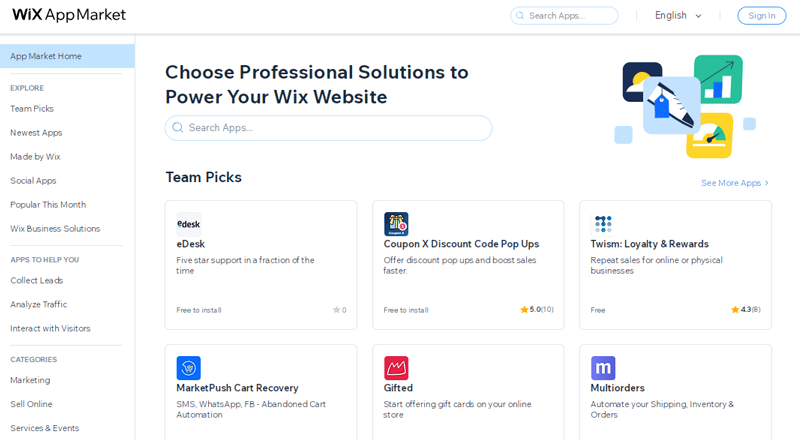
However, you can find the needed functional apps to increase the functionality of your site. It currently has over 200 apps and add-ons in 6 different categories. That includes marketing, selling online, services and events, design components, media and content, and communication.
There are various free Wix Apps that are available to you for free. Furthermore, the premium ones are also reasonably priced as they range from $5 to $30. This makes it suitable for small stores and budget-friendly eCommerce sites.
App Store in Shopify.
On the other hand, you can find a wide range of functional apps in Shopify’s app store. This helps you to expand the scope of your store or eCommerce website without any limit.
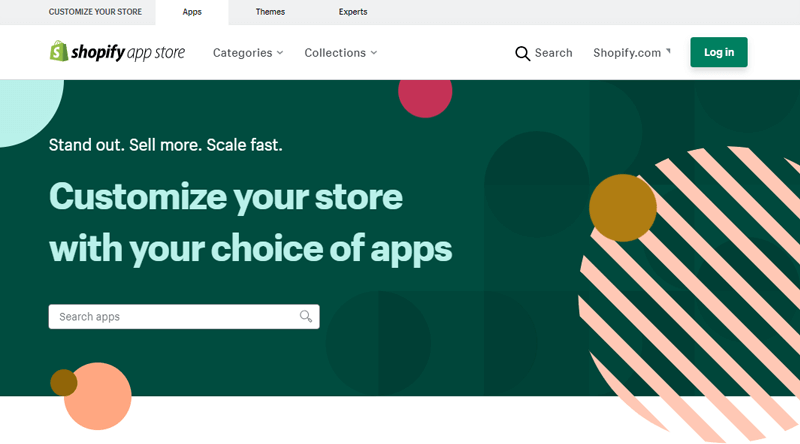
Essentially, you can find over 5000 apps, including third-party apps, to add extra functionality. Shopify categorizes these applications into 12 categories and 9 collections to make it easier for consumers to discover the right app. You can create a wishlist, dropship, post product reviews, and much more.
Practically, you’ll find everything that you need to sell online. There are few free apps, and most of them are premium ones that are comparatively expensive than Wix’s apps.
Winner- Shopify
Wix apps are comparatively budget-friendly than Shopify. However, the number of apps is very limited compared to Shopify.
The number of apps in Shopify is vast, providing more growth and expansion scope to your eCommerce site. As a result, you’ll easily find the solution that you’re looking for without much hassle. This makes your website functional and saves a lot of your time.
Thus, in this comparison round between Wix vs Shopify, Shopify wins.
D) Wix vs Shopify – Support
When developing a website on a new platform, even experienced users sometimes get stuck. So when you’re in a situation like this, you want good customer service to help you solve your concerns.
Every website builder offers customer support, allowing you to obtain answers to your questions quickly. That’s why you’ll want to see if your desired platform provides sufficient help to its users promptly.
So, let’s take a look at Wix and Shopify’s support services.
Customer Support Options in Wix.
Wix does provide decent customer support if you ever run into any kind of problems. It has a separate Wix Help Center section on its official website for customer support.
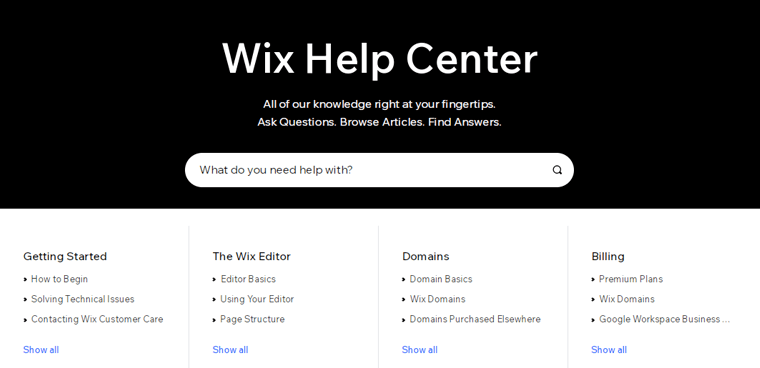
There you can find massive resources with hundreds of guides and documentation articles. This further helps you to utilize Wix and solve frequent problems and concerns.
In addition, they also have an active community of people that help each other out. You can easily get answers to a variety of your queries from such active forums.
Wix is one of the decent website-building platforms, so there are various blogs on the web that can help you out.
Besides, it provides live phone and email assistance to its paying customers. They have a support team on hand to assist you with any problems you may have.
Customer Support Options in Shopify.
Shopify offers everything you need in terms of customer service under one roof. Simply visit their official website and select Learn from the menu bar. This will then provide you with a comprehensive list of everything available.
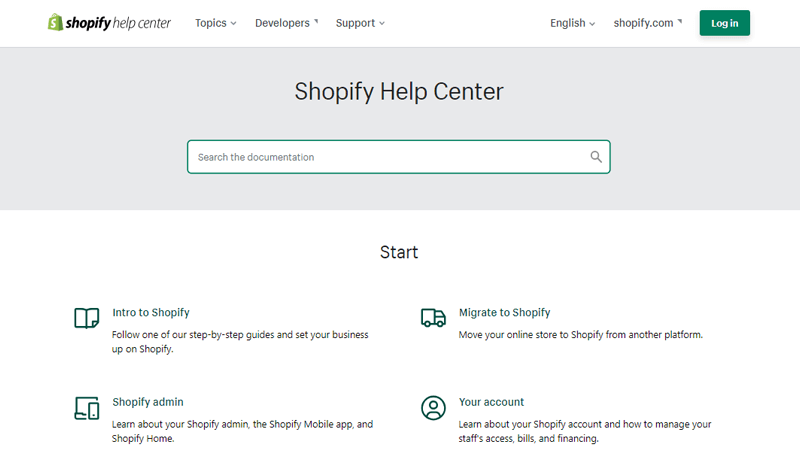
If you go to the Help Center, you’ll find all of the pre-written content you’ll need, from Intro to Shopify to Market Analytics. You can enter the queries and look up the documentation for further details.
Aside from that, Shopify Blog has a variety of blog posts to assist you in starting and growing a successful business. These blogs also offer business suggestions to help you get started with your eCommerce site.
If you run out of any sort of issues, then you can quickly get 24/7 customer support via social media and email. You can also join their community forum to resolve your problems swiftly.
Winner – Tie
There is no doubt that both Wix and Shopify provide decent support to their customers.
Wix provides a separate help center built for helping you with your queries and confusion. It has tons of documentation that can guide you throughout the process. And so does Shopify. It also has a dedicated help center to get all the pre-written documents that’ll guide you.
So, we can consider this round of Wix vs Shopify as a tie.
E) Wix vs Shopify – Pricing Plans for eCommerce
The cost of a site platform is another important consideration when determining which platform to utilize for your eCommerce website. It’s because you’re more likely to pick the one that’s within your budget.
So, in this round of Wix vs Shopify, let’s compare the pricing plans for eCommerce in these 2 platforms.
Pricing Plans of Wix.
Even though you can make a website freely on Wix you’ve to upgrade to one of its plans for accepting online payments.

Wix provides 3 pricing plans under its business and eCommerce plans. They’re as follows:
- Business Basic: This plan costs you $17/month. It’s the cheapest plan available for accepting online payments. In this plan, you also get 20 GB of storage space with unlimited bandwidth. You also get a 5 hours video limit to showcase the videography of your products and services.
- Business Unlimited: You can get this plan at $25/month. It’s the popular eCommerce plan offered by Wix to grow your business. You also get 35 GB of storage space with unlimited bandwidth. And, you also get a 10 hours video limit to detailly showcase your products and services.
- Business VIP: This plan costs you $35/month to get the full suite of an eCommerce website. Here, you get 50 GB of storage space with unlimited bandwidth. Even better, this plan provides you with unlimited video hours as well as priority customer care.
All of these plans offer secure online payments, customer accounts, custom domain, free domain for 1 year, removes Wix ads, etc. Besides, if you’re not satisfied with Wix, it has a 14 days money-back guarantee scheme.
Pricing Plans of Shopify.
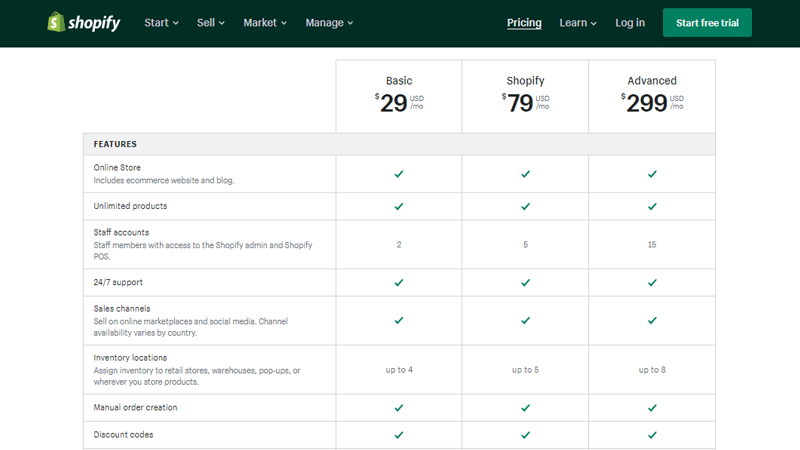
Similar to Wix, Shopify also provides 3 different plans to choose from. They are as follows:
- Basic: This plan costs you $29/month and it’s suitable for new eCommerce businesses with occasional in-person sales. Here, you get 2 staff accounts, up to 4 inventory locations, and up to an 86 % shipping discount.
- Shopify: It costs you $79/month and it’s best for growing businesses selling online or in-store. In this plan, you get 5 staff accounts, up to 5 inventory locations, and an 88% shipping discount.
- Advanced: You can get this plan at $299/month. It’s suitable for scaling businesses that require advanced reporting. This plan provides you with 15 staff accounts, up to 8 inventory locations, with up to 88% shipping discount.
Not to mention, all of these plans include an online store, unlimited products, sales channels, 24/7 support, abandoned cart recovery, fraud analysis, and many more.
Besides, Shopify also provides other 2 plans:
- Shopify Lite: It costs you $9/month that includes financial reports, in-store inventory, split-bill, gift cards, mobile POS, and QR code product details.
- Shopify Plus: This plan costs you $2000/month. It offers built-in AR, 60% faster checkout, 18% higher conversion, video, and 3D media on your store.
Moreover, Shopify also offers a 14-day free trial period with all functions enabled throughout the trial period. This way, you can properly evaluate the platform before enrolling in one of its premium plans. If you are not happy with their service, then you can terminate your trial account at any moment.
Winner- Wix
Shopify provides more pricing schemes to choose from, but its prices are comparatively high. Meanwhile, Wix’s pricing plans are quite budget-friendly. If you’re just starting your online store or eCommerce website, then budget-friendly is the way to go.
Thus, Wix comes out on top in this round of Wix vs Shopify.
F) Wix vs Shopify – SEO and Marketing
Simply put, Search Engine Optimization (SEO) is a technique for improving your site’s visibility in search engine results. It’s influenced by a variety of factors such as speed, high-quality content, security, and more.
Similarly, you can grow your eCommerce website to higher heights with the right marketing strategy, mainly digital marketing.
As a result, you need a website-building platform that provides good SEO and marketing options. So, let’s look at the SEO and marketing features offered by Wix and Shopify.
SEO and Marketing in Wix.
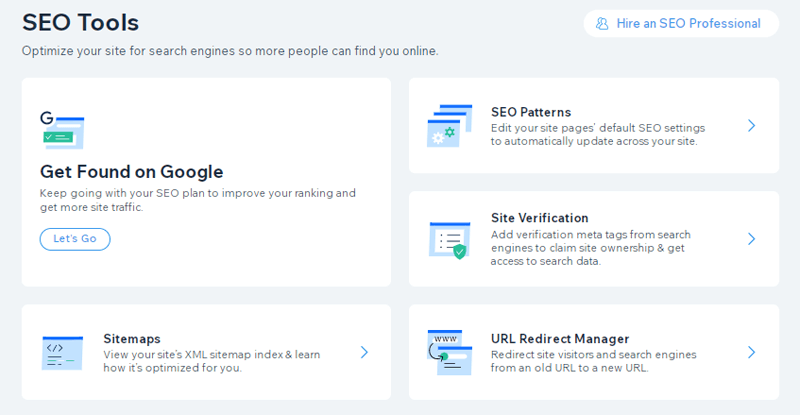
Wix performs admirably in terms of Search Engine Optimization (SEO). As it’s a fully hosted and managed site-building platform, it comes with a comprehensive set of SEO tools. Essentially, Wix provides you with a practical SEO setup strategy, Google index your site in seconds, and many more.
Similarly, it includes Facebook and Instagram marketing to help you reach the relevant customers. All you need to do is create a Campaign and Wix takes care of audience targeting, sales tracking, A/B testing, etc.
You can also provide discount coupons to entice customers to your store. To be more specific, you can offer free shipping, discounted prices, and a percentage off with promo codes.
In addition, you can add live chat and create loyalty programs such as coupon codes, discounts, etc. This helps you to develop recurring visits of your customers to your eCommerce website.
Besides, Wix facilitates various branded marketing campaigns such as email marketing to entice your customers back to your store. You can choose from one of its stunning email templates and personalize it to match your brand’s appearance and feel.
SEO and Marketing in Shopify.

Shopify also provides built-in SEO and tools to optimize your website’s content for better search engine ranking. You can change the title tags, meta descriptions, and URLs for blog posts, goods, collections, etc.
Also, some SEO is handled automatically where auto-generated canonical tags are added to pages. This helps to avoid duplicate material from showing in search results.
Similarly, its themes generate title tags that incorporate your website name automatically. It also has social media linking and sharing capabilities to make your selling experience easier.
Likewise, you can develop and manage various promotional marketing initiatives with Shopify. It provides you with Shopify Emails for email marketing. You can also collect various details and info of customers as well as use Shop Codes for discounts. In addition, it also facilitates marketing on Facebook and Google.
Winner- Shopify
Shopify has comparatively more SEO and marketing possibilities than Wix. It has both manual and automatic SEO for a better ranking of your eCommerce websites. Also, Shopify has more competitive marketing strategies that make it a winner in this round of Wix vs Shopify.
On the other hand, Wix is also a pretty good option for SEO and marketing.
G) Wix vs Shopify – Pros & Cons
As of now, we’ve explored both Wix and Shopify in many areas of Wix vs Shopify. So, let’s go over the pros and cons of each of them.
Pros & Cons of Wix.
Pros of Wix
- It’s a hosted platform with a range of plans depending on the nature and needs of your site.
- Easy-to-use and beginner-friendly platform for swiftly building your own website that requires no coding knowledge.
- Affordable pricing schemes make it suitable for small online stores and eCommerce websites.
- Provides a simple drag-and-drop interface for creating websites.
- It doesn’t take any commission charges on any plans.
- A plethora of templates to choose from for your eCommerce website.
- Offers a plethora of customization possibilities to create an eCommerce site of your choice.
Cons of Wix
- You cannot change the theme once your eCommerce site goes live.
- Fewer capabilities and features in comparison to Shopify.
- Not suitable for larger online stores and eCommerce websites.
- Customizing themes can be a little overwhelming for beginners.
Pros & Cons of Shopify.
Pros of Shopify
- A fully hosted platform built dedicatedly for eCommerce websites.
- Quick and easy to set up to get your eCommerce site running in no time.
- Includes a handful of visually appealing and mobile-friendly templates for your site.
- Suitable for both small and large online stores and eCommerce websites.
- Mobile apps for iOS and Android allow you to manage your store on the go.
- Sell your products on multiple social platforms such as Facebook, Instagram, and eBay.
- Offers 14 days of free trial without requiring any credit card.
- Provides 24/7 excellent customer support.
Cons of Shopify
- Limited customization possibilities in comparison to Wix.
- You’ve to pay commission charges from up to 0.5% to 2% per sale.
- Pricing plans are comparatively more expensive than Wix.
H) Quick Comparison: Wix vs Shopify
So, here’s a quick comparison of Wix vs Shopify.
| Base of Comparison | Wix | Shopify |
| Performance | Although the metrics are a little low, the real-world performance is excellent. | The performance is perfect that is in line with industry standards. |
| Designs & Templates | Comes with 800 free appealing templates on various niches. | Includes 10 free themes and 90 premium themes for eCommerce. |
| eCommerce Features | It has good eCommerce features. | It’s a dedicated e-Commerce site-building platform with really good eCommerce features. |
| Commission Charge | It takes no commission fees. You can save a bigger proportion of your income. | It takes up to 0.5% to 2% of your per sale on the website. |
| Starting Price | The basic eCommerce package costs you $17/month. | The basic package costs you $29/month. |
| Support | Callbacks and email options are available. | 24/7 customer support with live chat, phone, and email. |
| Website | Wix.com | Shopify.com |
Our Recommendation
It’s, after all, entirely up to you to choose which website platform to utilize based on your needs. Both Wix and Shopify offer useful features and functionality for creating a feature-rich eCommerce website. And each has its own set of benefits as well as drawbacks.
Based on the above comparison results, you may have already identified the appropriate platform. However, if you ask us to choose between the two, we’ll choose Shopify over Wix. There’s no way around it.
Shopify is indeed a powerful eCommerce platform built dedicatedly for eCommerce websites. It’s a bit pricey but what you get is worth the price paid. As a result, you can enjoy the robust online store or eCommerce website in the long run.
But why not if you choose Wix? It certainly provides excellent online creation tools without bothering about hosting for your eCommerce site. However, note that it has fewer capabilities than that of Shopify. And might be quite a hassle for you in the long run.
Conclusion
That’s all there is to it, folks! We’ve come to the end of our Wix vs. Shopify comparison article.
We hope you now have a better idea of how Wix and Shopify are similar and different. We also hope you’ll be able to choose the best platform as per the needs of your eCommerce website.
If you’ve utilized any of these platforms before, then please let us know what you think. If you have any additional questions, we’ll be happy to help.
Also, do check out our other articles on Shopify vs BigCommerce and WooCommerce vs Shopify.
You might also be interested in our article on the top WordPress eCommerce plugins and a step-by-step guide on how to build a website.
Lastly, we welcome you to connect with us on social media platforms such as Twitter and Facebook for more related content.
